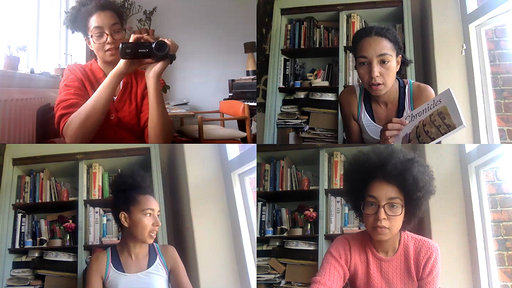
JADE Montserrat’s lockdown film, Chronicle ia, goes online from July 7 as the latest digital commission for Scarborough Museums Trust.
“When 60,000 people are dead and a disproportionate amount are disabled, elderly and black and brown people, that’s a eugenic project,” says Montserrat in her 13-minute film as she considers the impact of lockdown.
Filming during a period of physical and “social” distancing caused by the COVID-19 pandemic, she chronicles the process of making and the new ways of being that encourage mutual support and acts of care as Montserrat searches for a methodology to apply Eve Sedgwick’s theory of “reparative reading in a visual form”. In a nutshell, that means envisioning the interconnectivity of art practice, public space, responsibility and care.
Working with art film-makers Webb-Ellis, Montserrat interprets reparative reading as a “process of decoding, describing and discussing imagery, visual and human relationships, to interrogate and challenge political structures and frameworks”.
“With a title that plays with processes of recording and documentation, Chronicle ia explores the personal and inter-personal impacts of lockdown through the documentation of a collaborative making process, emphasising new ways of co-existing that are based on support,” explains Montserrat, whose films reveals the process of making through making, using the online platform Zoom for a series of digital conversations.
As Montserrat says in the film, in response to the Corona crisis: “When 60,000 people are dead and a disproportionate amount are disabled, elderly and black and brown people, that’s a eugenic project…When is it that we rebel? When is it that we say ‘No’?”

Within the film are references to Scarborough Museums Trust’s collection of photographs by James Harrison, taken during numerous hunting trips in Africa and India between 1892 and 1910, in particular Harrison’s “debasing images of atrocities towards local peoples and the slayed bodies of innumerable animals”.
As Montserrat prepared to research this collection of photographs, diaries and taxidermy animals, she asked British/Canadian filmmakers Caitlin Webb-Ellis and Andrew Webb-Ellis to explore this with her to sustain her through the trauma of engaging with the material as an act of mutual care.
“Reflecting on the geographic, experiential, cultural and social spaces inhabited by the artists – filming is located in their respective isolations within Scarborough Borough – the film presents a discussion aiming to define global imaginaries that traverse histories, nations, ideologies and time to help us conceive a new world that is built on principles of equality, support and social justice,” says Scarborough Museums Trust.
“The film’s imagery demonstrates glitches in communication, revealing how reparative reading involves a gradual – and sometimes incomplete – piecing together of practices and subjective viewpoints, but that, ultimately and beautifully, a common goal can be achieved.”
As Scarborough Museums Trust continues to improve access to its online content, Chronicle ia includes audio descriptions embedded in the film as part of the creative process, along with subtitles. Please note, the film contains photographic documentation of colonial atrocities and explicit images of violence and nudity. Consequently, the trust strongly recommends viewing for adults only, or those aged 12 and over with parental or guardian supervision.
Montserrat’s film can be seen on the trust’s YouTube channel, www.bit.ly/YouTubeSMT, from Tuesday, July 7. Chronicle ia is one of a series of new digital commissions from Scarborough Museums Trust as part of its response to the pandemic crisis. The trust has asked artists Kirsty Harris, Jane Poulton, Wanja Kimani, Feral Practice, Jade Montserrat, Lucy Carruthers and Estabrak to create digital artworks for release online across social media platforms throughout the summer.
